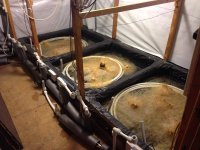inquisitiveone
New member
Hey guys, I'm looking into running staggered runs on different photoperiods with DWC.
I'm thinking of getting a 1/4 or 1/2 HP water chiller and cooling all the different reservoirs with just the one chiller.
My question is how should I go about this?
I can get a stainless steel heat exchanger but I'm not sure if the hydro solution will eat away at it/poison the plants in time.
I could just run chilled water in tubing throughout the reservoirs as well but not really sure how well that'll work.
Anyone have any experience in this?
I'm thinking of getting a 1/4 or 1/2 HP water chiller and cooling all the different reservoirs with just the one chiller.
My question is how should I go about this?
I can get a stainless steel heat exchanger but I'm not sure if the hydro solution will eat away at it/poison the plants in time.
I could just run chilled water in tubing throughout the reservoirs as well but not really sure how well that'll work.
Anyone have any experience in this?





